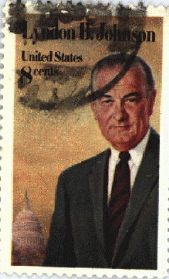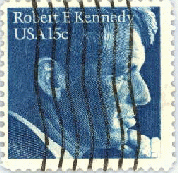FRtR > Outlines > American History (1990) > Chapter Eight > The Johnson Years (18/22)
An Outline of American History (1990)
Chapter Eight
The Johnson Years (18/22)
< Previous Page * Next Page >
President Kennedy's vigorous personal role in the search for
peace abroad and social progress at home came to an abrupt and
tragic end on November 22, 1963, when he was shot down by an
assassin in Dallas, Texas. While the world mourned his death,
the Presidency passed to Lyndon
Johnson, who had been
Kennedy's choice for Vice President.
 In his first address to the
Congress, the new President urged
speedy passage of two major domestic programs that President
Kennedy had helped to formulate. A civil rights bill, as approved
initially by the House of Representatives, provided the strongest
federal protection to date against racial discrimination. A tax
reduction bill which became law early in 1964, called for sharp
cuts in personal and corporate income tax rates. Its purpose was
to stimulate the economy and reduce unemployment by giving
consumers more cash to spend and businesses more money for
investment and expansion.
In his first address to the
Congress, the new President urged
speedy passage of two major domestic programs that President
Kennedy had helped to formulate. A civil rights bill, as approved
initially by the House of Representatives, provided the strongest
federal protection to date against racial discrimination. A tax
reduction bill which became law early in 1964, called for sharp
cuts in personal and corporate income tax rates. Its purpose was
to stimulate the economy and reduce unemployment by giving
consumers more cash to spend and businesses more money for
investment and expansion.
President Johnson won additional support for the tax
measure by announcing substantial cutbacks in military spending and
stricter economy in running the government. A considerable part
of these savings was to be used in a massive "war on poverty."
Nearly one-fifth of all American families, the President reported,
had incomes under $3,000 a year, far below the level ofwell-being
enjoyed by most Americans. Johnson proposed to coordinate
government agencies concerned with the problem and, by a
combination of intensified education, job training, new
industries, and improved welfare measures, to bring the living
standards of the underprivileged to acceptable levels.
As for foreign affairs, President Johnson, addressing
Congress early in his administration, said: "This nation will keep its
commitments from South Vietnam to West Berlin. We will be
unceasing in the search for peace; resourceful in our pursuit of
areas of agreement even with those with whom we differ; and
generous and loyal to those who join us in common cause."
In the November 1964 election, the people gave Johnson the
highest percentage of votes ever cast for a presidential candidate,
sweeping him into office by a margin of more than 15 million
votes. The following March he spelled out his personal aims:
"I do not want to be the President who built empires, or
sought grandeur, or extended dominion. I want to be the
President who educated young children to the wonders of the world.
I want to be the President who helped to feed the hungry and to
prepare them to be taxpayers instead of tax-eaters. I want to be
the President who helped the poor to find their own way and who
protected the right of every citizen to vote in every election. I
want to be the President who helped to end hatred among his
fellowmen and who prompted love among the people of all races
and all religions and all parties. I want to be the President who
helped to end war among the brothers of this earth."
The Johnson Administration, however, became increasingly
concerned with military action. The American forces in South
Vietnam were steadily increased. Then, in April 1965 more than
20,000 troops were sent to the Dominican Republic to restore
order between contending factions of Dominicans in the early
stages of a civil war. At U.S. request, the OAS established an
Inter-American Peace Force, which joined the American forces
and converted the unilateral intervention into a multilateral
operation. Following thc easing of tension and an election in June
1966, the troops were withdrawn.
Vietnam was a different story. Before his Administration
ended, President Johnson had committed more than half a
million men to the conflict in Southeast Asia. Not until May 1968,
after Johnson, facing a challenge within his own party over the
war issue, had decided not to run again for President, did the
United States and North Vietnam agree to hold preliminary
peace talks in Paris.
The cost of the war, coupled with record spending on
domestic programs, and a substantial rise in average family income,
exerted strong inflationary pressures on the nation's economy,
the most severe since the immediate post-World War II years. In
1968, the dollar was buying 10 cents less in goods than the 1964
dollar, and annual inflation had reached 2.5 percent.
Unemployment figures continued to drop, but the number receiving
welfare assistance, particularly in the large cities, steadily climbed.
For most of the nation the Johnson years were a time of
prosperity although there was serious concern about the worsening
balance of payments deficit and the resulting decline in U.S. gold
reserves. The deficit, however, was due in part to growing
American investments abroad, growing expenditures by Americans
overseas, more buying of foreign goods, and higher incomes at
home. Offsetting the nation's economic problems was the great
economic growth achieved from 1961 to 1969 , the greatest, in
fact, in American history.
These years also saw a wealth of social legislation. Congress
passed more civil rights bills than in any comparable period in
American history. Once again Congress raised social security
benefits. In 1965 the country established a milestone in social
legislation when Johnson signed into law the Medicare program,
a non-profit health insurance system for the aged. In response to
civil inequalities, Congress enacted legislation to insure the voting
rights of black Americans, who, in some southern states, had been
required to Lake discriminatory literacy tests. Congress and the
states, meanwhile, ratified the Twenty-fourth Amendment to the
Constitution which forbade any state to maintain a poll tax as a
requirement for voting in a national election.
In 1965, a year after enactment of these suffrage measures,
the first of a series of riots that were to scar numerous American
cities during the next several years exploded in Watts, a
predominantly black section of Los Angeles in California. In six days 35
persons were killed and hundreds of buildings destroyed.
Angered by what they considered slow and uneven progress after
decades of social neglect and discrimination, and at times spurred
by militants, blacks resorted to violence in -Chicago, Cleveland,
Detroit, Newark, and scores ofothercommunities. In April 1968,
a downtown section of the nation's capital was racked by burning,
rioting, and looting in an emotion-charged response to the
assassination of
Martin Luther
King, Jr., the nation's foremost black
leader, who had been murdered by a sniper's bullet while
standing on the balcony of a motel in Memphis, Tennessee.
 Two months after King's
death, Senator Robert F. Kennedy,
brother of the late President, also died from an assassin's bullet
after being struck down in a Los Angeles hotel while campaigning
for nomination as President. Later that summer, the national
convention of the Democratic Party, held in Chicago, was the
scene of a bloody confrontation between anti-war activists and
Chicago police.
Two months after King's
death, Senator Robert F. Kennedy,
brother of the late President, also died from an assassin's bullet
after being struck down in a Los Angeles hotel while campaigning
for nomination as President. Later that summer, the national
convention of the Democratic Party, held in Chicago, was the
scene of a bloody confrontation between anti-war activists and
Chicago police.
Unrest and violence were symptomatic of deep changes
taking place in America. An ever-increasing number of Americans
became dissatisfied with the impersonal aspects of mass society
and large government, the war in Vietnam, and continuing
aspects of discrimination against persons because of their sex,
ethnic background, race, or life styles. The 1960s, therefore,
witnessed many changes in attitudes, personal relationships, values,
and even dress and manners.
Dramatic technological changes also were evident. The
December 1968 flight of Apollo 8 carried astronauts Frank Borman,
James LoveIl, and William Anders into lunar orbit. First to
venture beyond the earth's gravitational pull, they journeyed farther
(more than 368,000 kilometers) from the Earth and faster (at
speeds approaching 40,000 kilometers per hour) than any other
persons in history. After spending Christmas flying around the
moon, the Apollo crew returned to Earth on December 27 and
executed a pinpoint landing in the Pacific recovery zone. This
event together with the release by North Korea of the crew of the
American ship Pueblo-which North Korea had seized off its
coast in January 1968-brightened Johnson's last weeks in office.
< Previous Page * Next Page >
 In his first address to the
Congress, the new President urged
speedy passage of two major domestic programs that President
Kennedy had helped to formulate. A civil rights bill, as approved
initially by the House of Representatives, provided the strongest
federal protection to date against racial discrimination. A tax
reduction bill which became law early in 1964, called for sharp
cuts in personal and corporate income tax rates. Its purpose was
to stimulate the economy and reduce unemployment by giving
consumers more cash to spend and businesses more money for
investment and expansion.
In his first address to the
Congress, the new President urged
speedy passage of two major domestic programs that President
Kennedy had helped to formulate. A civil rights bill, as approved
initially by the House of Representatives, provided the strongest
federal protection to date against racial discrimination. A tax
reduction bill which became law early in 1964, called for sharp
cuts in personal and corporate income tax rates. Its purpose was
to stimulate the economy and reduce unemployment by giving
consumers more cash to spend and businesses more money for
investment and expansion.
 Two months after King's
death, Senator
Two months after King's
death, Senator